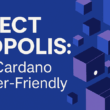In the PoS (Proof of Stake) consensus system, delegation is the lifeblood that flows through the arteries of the blockchain. Without consensus, the network would not exist, because there would be no validation of transactions on its ledger.
Pool operators, who assemble their validating node, form the first intention of consensus, but the delegating community, which does not have its own node, entrusts its power of participation to the operator it chooses. To delegate ADAs is to vote a representative into the blockchain consensus. Participation requires effort for operators, keeping their stake pool updated and connected, and allocating funds as a “pledge”, their skin in the game. Delegation also requires effort, allocating funds of their own from the wallet, with a delegation key created for the task, but without giving up private keys. Both efforts are rewarded with ADAs.
The PoS has the amount of active staking as the main parameter for choosing validator nodes. While it is a lottery, the weight of each pool’s delegation determines its interval as the slot leader (and sign block), or its “luck factor”.
The consensus of the blockchain is directly related to decentralization, since the concentration of validation power in a few actors makes the network less secure and more prone to manipulation.
Proxy wallets have grown almost 7 times since the beginning of the year.
The adoption of Cardano involves a lot of new members in the community, who need to be informed about the activity of participants in the blockchain consensus.
In the paper published by Professor Aggelos Kiayias, on the IOHK blog, The general perspective on staking in Cardano a best practice guideline for operators and delegators is proposed, to keep Cardano decentralization healthy. One of the points of “Guidance for delegators” is “Know your pool(s) – Investigate the pools’ available data and information”.
So, Giovanni’s proposal, walks in that way. Let me tell you about it.
The Proposal: StakeBoard
For this FUND6, Giovanni Gargiulo proposes a trusted platform for SPOs and delegates to connect, participate, communicate, research, educate and collaborate. It is an evolution of communication in the Cardano ecosystem.
Currently there are several web platforms for reporting on pools, with general information, performance and amount of delegation, among other metrics, but it only allows the operator to reference a few pieces of information they want to include, their website and social networks. These platforms fulfill their function of network metrics and delegation data very well, but they do not contain more information about each pool, let alone allow online interaction.
StakeBoard is a distributed, integrated application built by and for stake pool operators and delegators, so that they can connect with each other and present updates on developments and projects.
StakeBoard will give insight into stake pools on the Cardano blockchain and in the future will add various dPos blockchains.
The idea also contributes to decentralization, because with simplified communication, delegators will better understand the community ecosystem, and bring their funds from the CEX (centralized exchanges) to the community pools.
The proposal is to facilitate communication in the community with the latest news about the pools, as traders can directly communicate and update their profiles and details on the platform, as well as publish articles, link videos and share knowledge about the Cardano ecosystem.
This makes it easier for delegators to learn about stake pool operators or initial offerings, as StakeBoard will have all that content.
The intuitive onboarding process in StakeBoard not only engages SPOs, but educates delegators, who are hungry for information on the best choice for delegating their ADAs.
As the network of SPOs and delegators grows, StakeBoard will solidify its position as the trusted standard.
The Roadmap
Ongoing
- Proof of Concept
- Proposal
- CICD and infrastructure
- Concept design
Month 1
- Stake pool Overview
- Stake pool creation meeting
- Stake pool claiming
- Stake pool overview with enhanced information
Month 2
- Implement feedback from users
- Improve stake pool filtering
- Incorporate stake pool operators and delegators to test the MVP.
- Dashboard Discover Overview
- Notification center
- Automation (changes made by SPO to pledge, fee, etc.)
- Manual (communication tool from SPO to delegators)
- User settings
Month 3
- Wallet integration: direct delegation from StakeBoard (partnership with external wallet).
- Related videos (reference on Youtube )
- Stake pool of the day (random choice)
- Relevant articles (reference on Medium)
- Educational portal
- Bonus: Cardano Calendar
Launch date: Early access registration TBD. MVP will be launched on January 1, 2022.
Defining Success
- In 3 months. Achieve claims from 10 stake pools with their profile setup and 200 users.
- In 6 months. Achieve claims from 50 stake pools with their profile setup and 1,000 users.
- In 12 months. Achieve claims of 300 stake pools with their profile setup and 15,000 users.
The Developer Behind StakeBoard
Giovanni Gargiulo has been SPO since October 2020, participant of the Pioneers Plutus program and the Emurgo Academy.
On his stake pool website, he tells us that he has more than a decade of experience in running fault-tolerant, local and cloud self-healing systems. He has had his Stake Pool since December 2020, with ticker: EASY1.
At FUND3 he presented A Blockchain powered Proof of Physical Address to implement a blockchain powered platform to provide proof of physical address in the KYC process, and at FUND5, his proposal Blockchain Authentication Mechanism was chosen for the requested funding of USD 6,000, to implement a decentralized authentication mechanism that persists on-chain, secrets and permissions based on native metadata and assets.
The Budget
The creation of the StakeBoard MVP, will involve USD 40,000 in the initial 3 months. This will cover the project, according to this allocation detail:
- Design USD 6,500
- Development USD 32,000
- Cost of service/hardware USD 1,500
Video: StakeBoard Connecting Delegators to SPOS – A cardano catalyst F6 proposal
StakeBoard beta design: https://beta.StakeBoard.net
You can see the proposal at Catalyst.
This article was written in Refine Stage and may have changes from the developers up to the Stage, which is ASSESS.










